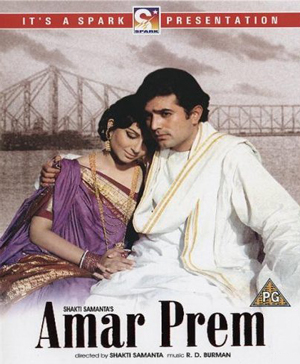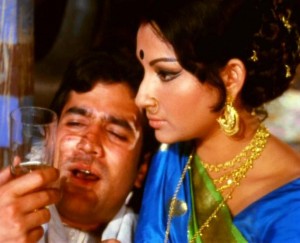 From its opening montage of a young rustic girl watching her callous husband bring home another wife, to the dying moments when the woman, now in her twilight years, is taken away to the relative comfort of her foster-son’s home as the festivities of Durga Puja break out on the streets of Kolkata… Amar Prem is a glorious homage to that favourite Bollywood archetype: the golden-hearted prostitute.
From its opening montage of a young rustic girl watching her callous husband bring home another wife, to the dying moments when the woman, now in her twilight years, is taken away to the relative comfort of her foster-son’s home as the festivities of Durga Puja break out on the streets of Kolkata… Amar Prem is a glorious homage to that favourite Bollywood archetype: the golden-hearted prostitute.
That Sharmila Tagore plays the woman whom men of all ages gravitate to in pursuit of some heavy duty nurturing is a very happy situation for the screenplay. In the film a 7-year old boy and a 30-plus man both desire the same kind of emotional attention from her.This prostitute is not about sex. She is about soul. Sharmila brings to this timeless adaptation of Bibhutibushan Bandhopaddhyay’s story, a kind of simpering beauty that levitates the lyricism of the tragic but uplifting tale to the level of a supremely seductive saga.
Sharmila’s character, a homeless childless woman who is tricked into a life of prostitution, is not just a mother-figure to the lonely neglected near-divorcee Anand Babu (Rajesh Khanna) she is also the woman the ill-treated neighborhood imp Nandu (Master Bobby who played pivotal roles in a number of films including Ek Phool Do Mali and Amar Prem before disappearing into adulthood) keeps running to for solace and samosas, in spite of being severely punished by his stepmother (Bindu).
In one of the many sequences simmering with seductive synergy Sharmila wonders aloud why Anand Babu insists on coming to her when he has a home and wife.
“Even Nandu has a home and a family. Why does he come to you?” counters Rajesh Khanna, thereby raising an important issue. Indian men of all ages look for their mother in every woman they love. In Amar Prem the oedipal complex is turned on its head…away from the bed. The men in Pushpa’s life want to be mollycoddled.Though she’s a prostitute she is never shown giving sex. Men want something far more basic from her. Pushpa is the Devi Maa reincarnated. So giving, the men forget she’s human after all.
Pushpa’s relationship with Anand Babu is purely platonic. She serves him drinks, provides him a much-needed shoulder to cry on. She is attentive and compassionate but never over-inquisitive. There is only one sequence where she actually asks him about his wife. And even there Anand Babu doesn’t tell her the truth about his marital life.
The truth is, his wife has no time for him.
Shakti Samanta was not just a master storyteller, he took grave risks with the draconian star system. At a time when Rajesh Khanna after the dream launch in Shakti’s Aradhana two years earlier, was the movie monarch the director cast Khanna as the third lead of Amar Prem. The film’s main dramatic and emotional resonance emanates from Pushpa’s unconditional love for the boy Nandu. Anand Babu comes later.
Sportingly Rajesh Khanna creates beautiful space for his character.The mutating paradigms of a life that knows no succour at home spills persuasively out of Khanna’s portrayal. He is a man who claims to hate tears and cries in tearless grief for love.
Perhaps sensing the superstar’s secondary status in the story Shakti Samanta gave Rajesh Khanna three memorable Kishore Kumar solos to sing. Each a landmark to this day.
But it’s Sharmila’s stylized but supremely seductive performance that holds the mutating plot together. Her heavy silk sarees, her elaborate hairstyles, the jewellery and quality of innocent coquettishness contribute cogently to making Amar Prem the experience that it is.
 There are moments of honey-dipped Pure Cinema carpeting this delicately-threaded tale of a Devi and her two devotees. The sequence shot in red-light area leading up to Lata Mangeshkar’s timeless and pristine ‘Raina beeti jaye’ is a classic study of divine seduction. It has its antecedents in the film Adalat which came 18 years earlier . The sequence of Nargis singing Lataji’s ‘Unko yeh shikayat hai’ in Adalat and Sharmila singing ‘Raina beeti jaye’ in Amar Prem are formatted on the principle of the Divine Woman’s magnetic voice and beauty pulling the tormented man into reading the sleazy ambience of the kotha as a place of worship.
There are moments of honey-dipped Pure Cinema carpeting this delicately-threaded tale of a Devi and her two devotees. The sequence shot in red-light area leading up to Lata Mangeshkar’s timeless and pristine ‘Raina beeti jaye’ is a classic study of divine seduction. It has its antecedents in the film Adalat which came 18 years earlier . The sequence of Nargis singing Lataji’s ‘Unko yeh shikayat hai’ in Adalat and Sharmila singing ‘Raina beeti jaye’ in Amar Prem are formatted on the principle of the Divine Woman’s magnetic voice and beauty pulling the tormented man into reading the sleazy ambience of the kotha as a place of worship.
Rajesh Khanna actually expresses his appreciation of Pushpa’s singing with folded hands. The Fallen Woman is irreversibly deified.
Indeed Amar Prem makes a silently screaming plea in defense of the Fallen Woman. The girls in the brothel mingle and chatter happily as though they’re in a run-down boarding school .
The concept of the anointed whore-goddess has its roots in the way Saratchandra Chatterjee had portrayed Chandramukhi in Devdas. Amar Prem carries the mythical concept forward to a heartbreaking crescendo of deification. No matter where the Fallen Woman, Pushpa is tossed by destiny she manages to raise moral standards around her.
In the most evocative section of her journey from ravaged innocence to pained old age, Pushpa ends up as a maidservant washing vessels in a rundown lodge(a lot of aged prostitutes find themselves reduced to menial jobs at the end of their lives). In a vivid reversal of fortune the husband(Manmohan) who had once driven Pushpa out of his home now lies on his deathbed in a pokey desolate room. She gives him his last drink of water. Then when he dies, like a true traditional Hindu wife she breaks her bangle with a rock in a symbolical gesture of widowhood.
The above sequence would probably seem laughable in the contemporary socio-cultural context where women scarcely wear glass bangles, let alone break them. But think about it. The woman, the wife, the mother and the daughter …every role that a girl is expected to play is subsumed in Sharmila Tagore’s commodious persona without commodifying her. She is at the same time, a full-bodied woman and a divine entity, flesh and flash of eternity…She is Every-woman and yet not quite like anyone else.And when Nandu shows up at the end to take her away, we feel the same surge of relief for her that we feel when a comatose relative finally leaves for the other world.










